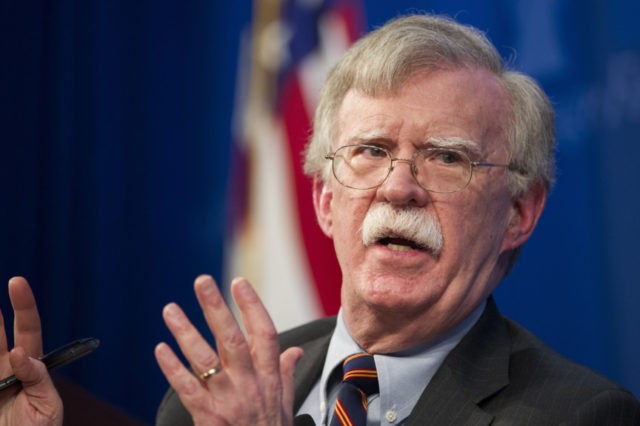U.S. National Security Adviser John Bolton recently confirmed that President Donald Trump’s administration is planning to leave behind a residual counterterrorism American force in Afghanistan to ensure the Taliban keeps its promises if the United States pulls its military out of the country as part of ongoing peace negotiations.
Earlier this year, President Trump expressed an interest in leaving behind a small U.S. military force that can potentially ensure the Taliban keeps its word of not allowing Afghanistan to serve as a safe haven for international terrorists like the group’s ally al-Qaeda and rival the Islamic State (ISIS/ISIL).
Bolton spoke to CNN in an interview that aired Sunday, amid the latest round of peace negotiations in Qatar between the United States and the Taliban that have been taking place since last week.
CNN asked whether or not the Trump administration can trust the Taliban terrorist group to keep its end of the bargain.
Bolton responded:
I don’t trust them just as a matter of faith. They will uphold it if it’s in their interest to uphold it.
What the president has decided is that it’s going to be important to try and keep a counterterrorism presence in Afghanistan. That’s a central part of these discussions. I can tell you that senior national security officials have been discussing this issue and how to try and bring it about, how to support the diplomacy that follow our counterterrorism objectives continuously.
We will be doing some of more it this week. It’s a very important point. We’re putting a lot of energy in it. But there’s no blind trust in the Taliban in this administration. That’s for sure.
As part of the ongoing talks, the United States has offered to pull out all of its 14,000 forces within five years in exchange for assurances that Afghanistan will not harbor international terrorists.
For years, the Pentagon has described the U.S. mission in Afghanistan as preventing the country from harboring international terrorists as it did under Taliban rule before the 9/11 attacks on the American homeland.
“The United States has a single vital national interest in Afghanistan: to prevent it from becoming a safe-haven from which terrorist groups can plan and execute attacks against the U.S. homeland, U.S. citizens, and our interests and allies abroad,” it said in its latest assessment of the war.
The Taliban rejected President Trump’s suggestion during his State of the Union that a counterterrorism force would remain in Afghanistan.
Taliban narco-jihadis have long demanded the complete withdrawal of foreign troops before it agrees to a peace deal.
U.S. Army Col. Chris Kolenda, who helped set up a back channel with the terrorist group, told the Daily Beast as the Trump administration intensified peace-seeking efforts last year that the jihadis were open to a small American military force remaining in Afghanistan to “continue training Afghan soldiers—including, hypothetically, ex-Taliban commanders,” among other things.
However, in responding to Trump’s State of the Union Address, a Taliban official stressed that “all” foreign troops must leave Afghanistan.
While the Taliban is intent on pushing out all U.S. troops, it appears it wants to keep the flow of American taxpayer funds into Afghanistan intact.
The Taliban claimed the U.S. has “promised” to continue funding nation-building efforts in Afghanistan — which have already depleted America’s coffers by more than $132 billion since the war began in October 2001.
U.S. Gen. Joseph Votel, the top American commander in the Middle East and Afghanistan, told lawmakers last month that the United States will have to continue funding the struggling Afghan security forces post-withdrawal to the tune of hundreds of millions annually to ensure they keep the region safe.
Although officials have used the vast majority (more than $80 billion) of the money devoted to reconstruction efforts to develop the Afghan security forces, they continue to face security lapses.
According to a U.S. watchdog agency, the Taliban controls or contest over 45 percent of Afghanistan’s districts, more than during any other time since American troops removed their regime in late 2001.
The Trump administration has made the negotiated political reconciliation between Kabul and the Taliban the primary goal of its strategy to end the more than 17-year-old war, intensifying efforts to pursue a peace pact after conceding that a military victory is unattainable.
Trump administration officials support Kabul’s offer to the Taliban of official recognition as a political force, a move that would effectively grant the group the opportunity to return to Kabul under a potential power-sharing agreement.
The Taliban, which is fighting to implement strict Islamic laws or sharia, considers itself the only legitimate government of Afghanistan. Despite U.S insistence, the Taliban has refused to allow the Afghan government to participate in the ongoing negotiations, dismissing Kabul as an American “puppet.”
Taliban jihadis generate most of their funding from trafficking and cultivating opium, the main ingredient of heroin — some of which is partly fueling the historic number of fatal drug overdoses in the United States.
Although President Trump has declared the opioid crisis in America a public health emergency and national security threat, the Pentagon inspector general revealed last month that his administration quietly ended an unprecedented U.S. airstrike campaign against the Taliban’s economic engine — opium and heroin. The decision came amid ongoing peace negotiations.

COMMENTS
Please let us know if you're having issues with commenting.